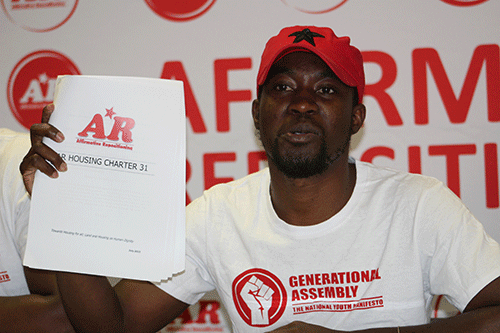The Affirmative Repositioning (AR) movement is at a crossroads, with its 2022 elective congress being the defining moment for the self-styled leftist entity that experienced turmoil in recent times and is struggling for relevance.
In November, about 400 AR activists will converge under one roof to adopt its constitution, elect leaders into various portfolios and also map out the future.
The assembly is slated for 4 to 6 November 2022 in the Erongo region. The movement will decide there whether it will transform into a fully-fledged political formation or not.
Dubbed the national assembly, the congress was confirmed by the AR’s leader and chief activist Job Amupanda on
Sunday following the Interim National Activists Council (INAC)’s meeting held in Opuwo over the weekend. There was, however, a notable absentee in the form
of Dimbulukeni Nauyoma, one of
AR’s founders. Nauyoma, New Era understands, informed the movement in May about his unavailability to serve in any structure. He headed the political education and mass mobilisation department.
“Dee had written in May that he is not available to serve in any structure, but remains an activist of the AR movement,” Amupanda said. Saturday’s meeting reviewed AR regional reports and assessed their preparedness for congress. Last week, Nauyoma reaffirmed his position. “As stated in my email communication of Thursday, 4 May 2022 at about 14h19 [my position] remains
intact and has not changed…I wish the leadership fruitful discussions as we plan towards the hosting of the first national activists’ conference,” reads a letter dated 20 September 2022 addressed to AR’s top administrator, Tuhafeni Hangula.
Wars
In recent times, AR’s top brass have engaged in public spats, with former spokesperson Simon Amunime and erstwhile head of elections Paulus Kathanga teaming up to pen a scathing letter in which they accused Amupanda of maleficence.
They also demanded for a rotation of AR’s Windhoek municipal councillors to allow unemployed activists a chance to make a living from the city’s lucrative perks.
The two were later removed from their positions. Kathanga has since left the movement.
“I am not part of AR. I don’t even have a comment on it,” he said yesterday.
On his part, Amunime could not say with certainty if the congress would take place, as not much has happened in terms of formalising structures from where
delegates would be drafted.
“Branches are the most important
thing. But if it is going to take place, I am looking forward to it. I am going to contest for the position of activist-in-chief”, he stated. Meanwhile, in the public space, the relationship between Nauyoma and Amupanda appears to be at an all-time
low. The duo has denied their purported strained relationship.
Regroup, rebuild
What is clear, however, is that November presents an opportunity for AR to regroup, rebuild and return to the former glory days which saw it mobilise Namibians to apply for land en masse in 2015, or the successful demonstration that blocked the construction of a N$3 billion new parliament, or continue limping into deterioration before disappearing into political thin air.
The above analysis is deduced from political commentator Ndumba Kamwanyah. He is not surprised that AR could register as a political party with the electoral commission.
“It is not a coincidence. That is why they participated in the local authority elections in Windhoek. They also supported several independent candidates.
They were testing the political ground and to see their ability and relevance to transform into a fully-fledged political party.
They do have evidence now. Their leader was even a mayor at some point,” Kamwanyah said. He, however, hastened to point out some shortcomings. “We have not seen much from Amupanda on the ground, apart from exposing corrupt activities. But we have seen some of his people, including Nauyoma, on the ground.
“They are becoming more vocal on workers’ issues. All of those are issues
where they can gauge their viability as a political party,” he added.
Moreover, Kamwanyah poked holes in AR’s relevance.
“They will have to reflect on that, and if people still believe in their relevance and ability to solve the issues. What has been achieved? The issues of land and housing
on which AR was founded are still
lingering,” he added.
At present, AR, the Landless People’s Movement, the National Unity Democratic Organisation, the Popular Democratic Movement and Swapo run the City of Windhoek council.
Kamwanyah took issue with this marriage of convenience.
“On policy and philosophical levels, AR
and Swapo are diametrically opposed. But we have seen them working together in the City of Windhoek. For me, it is good that they are able to strategise and form an alliance. But they have to answer to the people, because many followed them because of the ideological differences and approach of doing things,” he observed.
He added: “In 2024, they could perform well at the polls, like the Economic
Freedom Fighters in South Africa, because the issues they stand for such as unemployment, land and housing are
still relevant. They also appeal to young people, most of whom will be voters then.”


